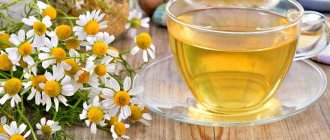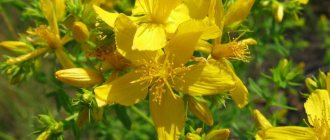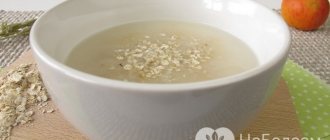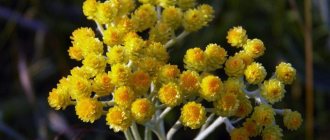Preparation, useful composition
The herbaceous plant reaches 1 m, prefers meadows, river valleys, and is found on forest edges and clearings. It is harvested during the flowering period, from June to September, and cut with garden shears. The raw materials are dried in a well-ventilated place, placed in a clean cloth bag and threshed with a stick to separate the grass.
Healing infusions, tinctures, and oil are prepared from the leaves and flowers.
St. John's wort treats with the beneficial properties of the tannins contained in it. They have a slight astringent and anti-inflammatory effect, destroy some microbes that are immune to the action of synthetic antibiotics.
The study confirms the antioxidant and antibacterial properties of St. John's wort essential oil.
It contains phenolic acids (chlorogenic), flavonoids quercetin, quercitrin, isoquercitrin, rutin, hyperoside, apigenin, as well as derivatives - hyperforin, hypericin.
The components included in the composition mutually enhance the therapeutic effect of each other.
Hyperforin contains leaves and flowers, its medicinal properties, as well as hypericin, are used to eliminate depression. Cineole is useful for raising mood and eliminating stress. The properties of St. John's wort to treat and eliminate depressive conditions are used as part of complex therapy.
St. John's wort glycosides - saponins - have an antidepressant effect, block substances that interfere with the production of serotonin, hinder the formation of sclerotic plaques, and have a mild tonic, diuretic and expectorant effect.
The medicinal properties of St. John's wort are enhanced by vitamin C. Flavonoids (vitamin P) in combination with ascorbic acid effectively reduce the permeability and fragility of capillary vessels, have an antispasmodic effect, and relax the smooth muscles of the bile ducts, blood vessels, intestines and ureter.
The medicinal herb contains carotene (a plant form of vitamin A), traces of vitamin B3 (niacin, nicotinic acid).
Macroelements: potassium, calcium, magnesium, iron.
Microelements: manganese, copper, zinc, chromium, selenium.
The study, citing numerous sources, claims that modern medicine has widely used St. John's wort formulations to treat mild to moderate depression.
Traditional medicine uses the healing properties of the plant in the treatment of bronchitis, burns, eczema, external skin damage (excoriation), hemorrhoids; the astringent effect of the infusion and tincture is useful for diarrhea. The plant is used as an anthelmintic, diuretic, choleretic agent, and also to stimulate menstruation.
St. John's wort oil is taken orally to treat gastritis, stomach ulcers, and inflammatory diseases of the colon. Plant-based compositions stimulate appetite and the secretory function of various glands.
Infusions of leaves and flowers are useful as a supportive agent in the treatment of nervous agitation, sleep disorders, rheumatism, for the treatment of neurological disorders - pain in the hip joint (coxalgia), menopausal neurosis, headaches, neuralgia, convulsions, tetanus (infectious disease of the nervous system) .
St. John's wort has a calming, antioxidant, anti-inflammatory, wound-healing, antifungal, analgesic, antiviral, hepatoprotective, and memory-improving effect.
What is St. John's wort rich in?
Any medicine, as is well known, becomes a poison if its recommended concentration is exceeded
It must be said that knowledgeable herbalists use all parts of the plant, while traditional phyto-medicine recommends only the ground, herbal - stems, leaves and flowers. And the point is not at all that the root does not contain any useful medicinal substances. Vice versa! Their concentration is so high that if consumed incorrectly, a person can easily cause damage to his health!
Any medicine, as is well known, becomes a poison if its recommended concentration is exceeded
Any medicine, as is well known, becomes a poison if its recommended concentration is exceeded. Voronets is rich without exaggeration in the concentration of useful and medicinal substances - a natural composition!
Judge for yourself:
- essential oils – at least 0.1% per 100 g of fresh herb
- essential oils – at least 13%
- tannins and resins
- carotene – provitamin A, promotes the growth and regeneration of bone and muscle tissue, protects cellular structures, reduces the risk of infectious diseases, strengthens the immune system
- rutin – bioflavonoid, vitamin P, improves capillary permeability, slows down the aging process of the body
- other flavonoids - anthocyanins, used as a mild diuretic, as well as for cardiovascular diseases, varicose veins and (in combination with other substances) helping to cope with dystrophy and degeneration of the retina.
- hyperforin is a powerful antidepressant that increases the body’s adaptive capabilities
- choline is the most important building block for the brain;
- phytoncides – plant biological substances that suppress and kill a number of protozoa, as well as bacteria and microscopic fungi
- nicotinic acid – stimulation of brain activity, blood circulation, metabolism of amino acids, fats, proteins and carbohydrates
- ascorbic acid – a stimulator of the launch of immune processes, necessary for the growth and restoration of mucous membrane tissue, promotes the absorption of iron, strengthens blood vessels, bones and joint tissues
- a whole range of different vitamins.
St. John's wort and its root
Thanks to such a rich composition, decoctions, infusions, teas and medicinal preparations from St. John's wort have astringent, anti-inflammatory and antimicrobial properties.
They have an antispasmodic effect on the smooth muscles of the bile ducts, blood vessels, ureters and intestinal walls, improve the outflow of bile, relieve gastrointestinal spasms, and increase daily diuresis.
- The bitter substances in the herb stimulate gastric secretion.
- The red pigment – hypericin (lat. hypericin) – an anthracene derivative normalizes intracellular reactions and enhances the absorption of ultraviolet rays by the skin.
- Liquid decoctions and infusions are necessary in the treatment of gastroenteritis, cholecystitis, stomatitis, gingivitis and periodontal disease.
- These same infusions reliably help with sore throats and rhinitis.
- Compresses and lotions made from fresh or dried herbs relieve pain and accelerate healing for deep burns of the 1st and 2nd degrees, extensive skin lesions, as well as ulcers and abscesses, boils and mastitis, abrasions and bruises.
- And all this because Volkhovitsa has pronounced antiseptic, sedative, antibacterial, regenerating, antidepressant, analgesic, and anthelmintic properties! Truly a healer’s magic herb!
Traditional healers recommend using weed more widely
It helps with:
- pulmonary ailments (bronchitis, asthma, tuberculosis)
- bedwetting, both in children and adults
- sciatica (remember Avicenna!)
- gout (deposition of salts in joint tissues)
- migraines (neurological headaches)
- diathesis (hypersthenic, asthenic and allergic)
- eczema
- psoriasis
- prostatitis
- for treating the scalp and strengthening hair follicles
Decoctions and infusions of “rabbit blood” are especially recommended for women with:
- treatment of thrush
- inflammations of a gynecological nature (vulvitis, cervicitis, colpitis, endometritis, metritis, erosion, etc.)
- dishormonal diseases (PMS, onset of menopause, menstrual cycle disorders of various origins)
The use of St. John's wort is unacceptable for pregnant women! Nursing mothers should not get carried away with tea with St. John's wort - the milk begins to taste bitter, and the baby may refuse to breastfeed.
Infusion, tincture, St. John's wort oil
You can ask for dried herbs or ready-made alcohol tincture at the pharmacy. But it is much more useful, especially in season, to use the medicinal properties of St. John's wort in fresh form. For example, juice contains one and a half times more beneficial properties than tincture.
It is recommended to take a total of 300 to 1200 mg of infusion per day (0.3% hypericin content).
Infusion
- Brew a glass of boiling water 1 tbsp. dried herbs, simmer in a water bath for 15-20 minutes, strain.
Prepare the infusion in enamel, ceramic, glass containers - metal and aluminum are not suitable. If necessary, the infusion time and the amount of plant material can be increased.
Tincture
- Fill half of a three-liter jar with grass and flowers, fill to the top with vodka, and close.
- Place in a cool, dark place and shake every day.
- After a month, strain.
The beneficial properties of St. John's wort tincture are used for external treatment - compresses, rubbing.
Oil
- Pour dried grass or flowers with vegetable oil, preferably cold-pressed (olive, sunflower, etc.). To prevent the plant material from becoming covered with mold, it must be entirely in oil, for which oppression must be used.
- St. John's wort oil acquires medicinal properties after a month. But it’s better to strain and bottle it in glass bottles after two months.
Store in a cool, dark place. The healing agent is used internally or externally.
Basic recipe
The classic way to prepare a decoction is a fairly simple recipe. It is listed on many herbal packages and in herbalists' reference books. Suitable for the treatment of most diseases listed in the indications.
How to cook:
- Place two tablespoons or 10 grams of raw materials into an enamel bowl.
- Pour the grass into a glass of boiled water, cooled to 50–70 degrees.
- Close the container with a lid and heat in a water bath for half an hour.
- Cool at room temperature for about 10–15 minutes, then strain and squeeze out the raw materials.
- Bring the resulting volume of liquid with warm boiled water to 200 ml.
How to take: half an hour before meals, 60-70 ml three times a day.
Where and how long to store: in a cool place for no more than two days.
Cough, cold
The study confirms the antispasmodic and bronchodilator effects of St. John's wort.
Cough. For diseases that accompany cough, the healing properties of St. John's wort oil are used:
- Heat the oil a little and apply to a soft cloth.
- Place a compress on your throat, cover the top with compress paper, and wrap your neck warmly.
Treatment procedures should be carried out before bedtime, at night. In the morning, wash your neck with warm water and soap.
In a similar way, St. John's wort oil is used in warming compresses on the chest.
St. John's wort is useful in helping to eliminate dry cough without sputum separation; it is used in inhalations:
- Brew a glass of boiling water 1 tbsp. herbs, strain.
Breathe steam for 15-20 minutes.
Throat diseases. For treatment, rinsing with alcohol tincture of St. John's wort is used:
- Prepare a water-alcohol solution at the rate of 20-30 drops of tincture per glass of warm water.
Gargle 5-6 times a day.
Sore throat:
- Add 1 tsp to a glass of warm water. table salt, 1 tsp. soda, 10 drops of iodine and 20-30 drops of St. John's wort tincture.
Treat your throat with gargles several times a day.
Treatment of colds, antipyretic properties.
Recipe 1:
- Brew a glass of boiling water, 1 tbsp of dry raspberry leaves, 1 tbsp. St. John's wort herbs or flowers, leave for 15-20 minutes;
- Squeeze the juice of several lemon slices into the infusion, add honey to taste.
Treat in the evening, before going to bed, then immediately go to bed.
Recipe 2:
- Mix 40 ml of St. John's wort tincture, the juice of a small onion, the juice of half a lemon, add a little warm water.
Take 1 tsp. several times a day. For an hour after administration, refrain from eating and drinking. Treat for 5 days.
Composition and beneficial properties of St. John's wort
St. John's wort contains many useful substances, which is why it has healing properties. The plant contains flavone compounds (rutin, quercetin, etc.), ascorbic and nicotinic acids, saponins, sugars, carotene, tocopherol, hypericin, cetyl alcohol, choline, hyperoside, phytoncides, essential oil, tannins, resins and bitter substances. The healing components allow this medicinal plant to be used quite widely. It is used as an antibacterial, antiseptic, analgesic, wound healing, antirheumatic, diuretic, choleretic, astringent, anthelmintic, and also as a regenerating drug.
Since ancient times, infusions from the herb St. John's wort, prepared in water, have been used to treat heart diseases, rheumatism, colds, flu, headaches, liver diseases, stomach diseases, bladder diseases, bedwetting, hemorrhoids, inflammation of the female genital organs.
And only very recently, medical scientists discovered another beneficial property of St. John's wort. Clinical studies have shown that the plant has a positive effect on the nervous system and has an antidepressant effect. This makes St. John's wort even more valuable, since it has almost no contraindications and does not cause side effects, unlike sedatives of chemical origin.
Let's take a closer look at the composition of St. John's wort:
- Tocopherol is vitamin E, which is necessary to protect the body from the destructive effects of free radicals;
- Carotene is a precursor to vitamin A. It is necessary for proper eye function, skin cell renewal, and the fight against viruses and bacteria;
- Tannins help cleanse wounds from infection, relieve inflammation, and accelerate healing;
- Nicotinic acid is necessary for the proper functioning of the heart and nervous system;
- Vitamin C increases immunity, promotes the restoration and renewal of cartilage and ligaments, maintains skin turgor, and prevents the degeneration of normal cells into cancer cells;
- Hypericin and hyperforin are special substances that have antidepressant effects;
- Hyperoside and rutin strengthen the walls of blood vessels;
- Phytoncides are plant “antibiotics” that have a powerful antimicrobial effect.
This combination of biologically active substances in the composition of a medicinal plant allows it to be used in the treatment of many diseases.
St. John's wort in cosmetology
This healing herb has proven itself well in the beauty industry. It has anti-inflammatory, tonic, anti-aging and antiseborrheic effects.
St. John's wort is successfully used for:
- Acne;
- Increased oily skin;
- Withering and wrinkles;
- Baldness and dandruff;
- Pustular skin diseases;
- Cracked heels.
Acne
For severe acne on the skin, daily evening washing with St. John's wort infusion is recommended. To do this, you need to take 1 tablespoon of chopped dried herb, pour 1 glass of boiling water and leave for 20 minutes. You need to wash your face with the infusion every evening before going to bed, do not get it wet with a towel, do not rinse it off, and let it dry on the skin.
Read more: Acne – what is it? Types of acne, causes and treatment methods
Increased oily skin
If a greasy sheen quickly appears on the skin, a strong decoction of St. John's wort will help you. Pour two tablespoons of dried herbs into one glass of boiling water, put on low heat and cook for 10 minutes. After cooling, strain and wipe your face with a cotton pad, let it dry, and rinse with cool water.
You can make a mask from steamed St. John's wort herb. To do this, pour two tablespoons of raw material into four tablespoons of boiling water, stir, and let it brew. The resulting slurry is applied to a cleanly washed face, avoiding the area around the eyes. Keep the mask on for 10-15 minutes. Rinse off with cool water. Do it no more than twice a week.
Withering and wrinkles
Ice rubs and St. John's wort based lotion will help restore skin tone. For ice rubs, you need to prepare a decoction of St. John's wort (see recipe above), cool, strain and freeze, pouring into special ice molds. Every morning after washing, it is recommended to wipe your face and décolleté with a piece of ice.
To make lotion, you need to mix 1 glass of St. John's wort infusion (see recipe above) and mix with 1 tablespoon of vodka. Wipe your face and décolleté after washing in the evening before bed.
Baldness and dandruff
For baldness, one third of a glass of St. John's wort infusion should be taken orally 10 minutes before meals, 2 times a day. To get rid of dandruff, you need to rinse your hair after washing with St. John's wort infusion prepared according to the recipe described above.
Pustular skin diseases
For pustular diseases, wipe the skin with a decoction of St. John's wort. To prevent the spread of infection to healthy areas, washing is carried out using a cotton pad. The disc should be moistened in the broth, squeezed lightly, and using blotting movements, treat the skin in an area with a radius of no more than 3 cm, throw away the used disc, and take a clean one. Repeat the entire procedure on the next area of skin.
Read more: Treatment of dandruff - 7 trouble-free methods
Cracked heels
To alleviate the condition, foot baths are indicated. To do this, you need to prepare 2 liters of decoction at the rate of 4 tablespoons of chopped herbs per 0.5 liter of boiling water, simmer for 5 minutes. Pour into a small bowl, cool to 45 °C (hot, but tolerable), lower your feet and hold until the broth cools.
Read more: Causes and treatment of cracked heels
Gastrointestinal diseases
The medicinal properties of St. John's wort are used in the treatment of gastritis, stomach and duodenal ulcers, liver and gallbladder diseases. The infusion is useful because it normalizes the intestinal microflora and eliminates stool disorders.
Heartburn
The medicinal properties of St. John's wort infusion are used for stomach pain, heartburn, and to normalize digestion:
- Brew 1 liter of boiling water, 1 tbsp mixture at a time. St. John's wort, dried herbs, yarrow, infuse.
Take half a glass warm half an hour to an hour before meals.
Gastritis
The cause of the disease is abuse of rough, spicy or fatty foods, monotonous nutrition. There is heaviness in the stomach, fullness, nausea. No appetite, weakness, fever.
The anti-inflammatory and soothing properties of St. John's wort infusion help with gastritis:
- Take St. John's wort infusion (recipe above) 1 tbsp. after meal.
Stomach and duodenal ulcers
Oil with St. John's wort has an astringent effect, stimulates appetite; in folk medicine, the herb has long been used to treat peptic ulcers. The exact dosage is selected individually after consultation with a doctor.
- To heal the ulcer during the day, take a mixture of 0.5 liters of St. John's wort infusion and 10 ml of lavender oil.
Hepatitis, cholecystitis
A common cause of hepatitis (liver inflammation) is alcohol abuse and viruses.
The body uses bile to digest fatty foods. With cholecystitis (inflammation of the gallbladder), after eating, the stomach hurts, nausea, bitterness in the mouth, and the temperature rises.
The formation of congestion in the gallbladder is prevented by flavonoids from St. John's wort; their medicinal properties complicate the formation of stones.
For the prevention and treatment of cholecystitis, cholelithiasis:
- take St. John's wort infusion (see recipe above) 1 tbsp. after meal.
Medicinal oil of St. John's wort is useful because it improves liver function and prevents the formation of gallstones.
Recipe:
- Pour 3 tbsp. St. John's wort 300 ml olive oil, add half a glass of red wine.
- Leave in a dark, cool place for a week, stir every day, and when finished, boil for 45 minutes.
- Leave for another month, then strain when finished.
Take 1 tsp for three months. once a day 15 minutes after eating.
Features of application
St. John's wort is used to treat various diseases of internal organs. The collection of medicinal herbs is carried out from mid-June to the end of September. Collect flowers. The raw materials must be distributed on a flat surface in a well-ventilated room. Dried flowers are separated from the stems and placed in a cardboard package, a natural fabric bag or a glass jar. Can be stored for no more than 1.5-2 years.
A drink prepared on the basis of St. John's wort helps to cope with heartburn and gastritis, and to recover from diseases of the gallbladder and liver. Diseases of the digestive tract are associated with the functioning of the nervous and cardiovascular systems. The herb restores the performance of the entire body. In most cases, decoctions, infusions, teas and alcohol tinctures are made with the addition of other medicinal herbs.
This method helps to enhance the effect of St. John's wort, activate the body's immune forces and improve health.
It is necessary to begin herbal treatment at the first signs of pathological conditions. At the pharmacy you can purchase raw materials or finished medicines based on the plant. You can prepare the flowers of the plant yourself. It is necessary to follow some rules for preparing medicinal drinks depending on the disease.
For gastritis
St. John's wort is used for gastritis to relieve inflammation and pain. The herb prevents the spread of inflammation to healthy areas of the mucous membrane. To prepare a healing drink you need to take 1 tbsp. l. herbs and pour 100 g of boiled water. Place in a water bath and simmer for 20 minutes. Drink 2 tbsp. l. three times a day, regardless of meals. Duration of treatment is up to 3 weeks.
You can mix equal amounts of dried herb and St. John's wort. Add 250 ml of boiling water and leave for 1 hour. Strain, take 50 g after meals for gastritis for 2 weeks. With proper treatment, heartburn, abdominal pain and cramps disappear.
You can prepare medicinal oil. Place 30 g of fresh herbs at the bottom of a glass bottle or jar and add 250 ml of olive oil. Can be replaced with flaxseed, sunflower or hemp seed. Leave in a dark place for 20 days. It needs to be shaken daily. Then pass the contents through several layers of gauze. Store in glass containers. Take 1 tbsp. l. on an empty stomach or 3 hours after eating. Drink for 30 days.
We recommend that you read: The benefits and harms of mint for the body
For gastritis with high acidity
St. John's wort for gastritis with high acidity helps to normalize the activity of the stomach. The infusion normalizes the production of gastric juice and prevents the negative effects of hydrochloric acid on the walls of the stomach. To prepare the infusion you will need 30 g of fresh or 15 g of dry raw materials. It is necessary to pour 1 cup of boiling water over the flowers and leave for 5-6 hours in a dark place under a lid.
Strain and drink 2 tbsp. l. 15 minutes before meals. As a result, heartburn disappears, nausea disappears, appetite appears, and abdominal pain disappears. Food is digested much better, and beneficial components are more fully absorbed. The recipe is also useful for colitis and urinary tract diseases.
With atrophic gastritis
For atrophic gastritis, doctors recommend taking herbal tea. You need to take 0.5 tbsp. l. knotweed herbs, St. John's wort for the stomach, blueberry leaves, yarrow, immortelle, chamomile and centaury. If desired, you can add tansy and sage. Pour the mixture with 2 cups of water and boil for 5 minutes. Remove from heat and leave for 45 minutes.
Strain and drink 1 glass in the morning and evening. You can take 1 tsp. calendula, wormwood, immortelle and St. John's wort. Pour 2 cups of boiling water over the raw material and let it brew for half an hour. Take half a glass twice a day.
The herbal collection helps restore processes at the cellular level, reduce the level of pain, and stop atrophic changes. The mixture has a wound healing effect. To enhance the effect, add natural honey, aloe juice and a piece of butter.
For diarrhea
For diarrhea, this remedy is considered one of the most effective. The herb has an astringent effect. It prevents the removal of useful substances from the body, restores water and electrolyte balance, and normalizes intestinal function. St. John's wort for diarrhea eliminates pathogens and stops the course of the inflammatory process.
If there are no stomach problems, you can prepare an infusion that will quickly relieve loose stools. Take 2 tbsp. l. dried raw materials and pour 1 cup of boiling water. Leave in a dark place for half an hour. Strain and drink half a glass 4 times a day. Drink warm water to prevent heartburn.
We recommend that you read: The difference between saffron and turmeric
Adults and children can prepare a decoction with the addition of chicory herb. You need to take 1 dessert spoon of herbs and add 2 cups of boiling water. Leave for 45 minutes in a glass container or thermos. Take 1 tbsp. l. every 3 hours.
Treatment lasts from 1 to 2 days depending on the patient’s condition. The infusion is effective for various poisonings that provoke disruption of the intestinal microflora. St. John's wort for diarrhea in adults is used within 24 hours after the onset of diarrhea.
For the intestines
The herb is used in the treatment of gastrointestinal diseases. Flowers eliminate harmful microorganisms, eliminate pain in the abdomen, and stop inflammatory processes.
The herb helps with intestinal infections, flatulence, constipation, and fermentation processes in the gastrointestinal tract.
To prepare a healing decoction, you need to pour 2 tbsp. l. raw materials 1 cup boiling water. Place in a water bath and simmer over low heat for 15 minutes, without waiting for it to boil. Drink 70 ml before meals. The duration of treatment is up to 10 days.
From worms
To combat parasites, dry or fresh flowers of the plant are used. In alternative medicine, worms and helminths are treated with a decoction or herbal extract. Take 2 tbsp. l. flowers with leaves and pour 1 glass of hot water. Leave in a dark place for 1 hour. Take 1 glass of decoction twice a day, half an hour before meals.
You can take St. John's wort for worms as an alcohol tincture. You need to take 4 tbsp. l. raw materials and pour half a glass of alcohol. Leave in a dark place for 2 weeks and shake daily. Strain and drink 20 drops three times a day 30 minutes before meals. The duration of treatment for helminthiasis is up to 2 weeks.
An infusion of various herbs is also effective. You will need 0.5 tsp. buckthorn bark, wormwood, yarrow, tansy and oak bark. Add the flowers of the medicinal plant and pour 2 cups of hot water. Leave covered for 10 hours, strain and drink 0.5 cups daily. Drink for 10 days, then take a break for 3 days and repeat the course.
For stomach ulcers
This plant has healing properties. St. John's wort for stomach ulcers destroys bacteria that lead to the appearance and progression of gastrointestinal diseases. It is necessary to regularly take tea, infusion or herbal decoction to relieve pain and inflammation.
To prepare tea, take 50 g of flowers, 25 g of mullein, 20 g of mint. Mix herbs and 2 tbsp. l. raw materials are poured with 2 cups of boiling water. Let it brew for 30 minutes. Drink 0.5 glasses 30 minutes before meals three times a day. Add honey or sugar to taste.
For stomach ulcers, make a decoction. Take 0.5 tsp. St. John's wort, lemon balm, cudweed, knotweed. Pour in 1 cup of hot water and bring to a boil. Remove from heat, leave for 1 hour. Drink 1 glass per day. Can be divided into 3 doses. Duration of treatment: 10 days.
We recommend that you read: The healing properties of pumpkin seeds
For diarrhea
If you have frequent bowel movements more than 3 times a day, you need to start treatment. This condition can lead to dehydration and electrolyte imbalance. St. John's wort for diarrhea restores intestinal microflora, fights parasites, relieves inflammation and normalizes stool. Add 10 g of dried flowers and leaves to a glass of hot water. Let it brew for half an hour.
Take the infused liquid 50 ml twice a day 15 minutes before meals. To prepare the decoction, take 50 g of flowers and add 2 glasses of water. Boil for 15 minutes. Strain and consume throughout the day. The duration of treatment is from 3 to 7 days.
Urolithiasis, cystitis
To treat diseases associated with impaired renal function, the anti-inflammatory, hemostatic, astringent, and diuretic properties of St. John's wort are used.
Urolithiasis disease . Acid-base imbalance is a common cause of kidney stones. My stomach hurts, I often want to go to the toilet, my temperature is elevated, I feel nauseous.
After consultation with a doctor, to prevent the formation and dissolution of stones, treat with St. John's wort infusion:
- Brew a glass of boiling water 1 tbsp. herbs, infuse, strain.
Take a third of a glass during the day.
Cystitis (inflammation of the bladder) is accompanied by pain when urinating. Tests are necessary to determine the nature of the infection.
After consulting with a doctor, treat the disease with herbal infusion:
- Stir 3 tbsp. chamomile, 4 tsp. oregano, 4 tsp. knotweed, 8 tsp. St. John's wort.
- Brew 4 tbsp liter of boiling water. mixture, leave for 12 hours, strain.
Take half a glass an hour after meals.
The study and evaluation of histological and biochemical results confirmed that St. John's wort protects against acute renal ischemia.
Oral cavity
Inflammation of the mucous membranes and gums.
Recipe:
- Brew 1 tbsp glass of boiling water. St. John's wort and sage, leave for half an hour, strain.
In the absence of sage, treat the mucous membranes by rinsing with a weak St. John's wort infusion.
The anti-inflammatory and disinfecting properties of St. John's wort are used in another medicinal infusion:
- Brew 2 tablespoons glass of boiling water. chamomile, calendula, St. John's wort, leave for half an hour, strain.
Rinse your mouth after eating.
Bad smell . The healing and anti-inflammatory properties of St. John's wort tincture are used in the treatment of bad breath and are used to strengthen gums.
Recipe for healing composition:
- Add 20-30 drops of alcohol tincture to half a glass of warm water.
Rinse your mouth several times a day.
Adenoids.
- Grind the St. John's wort into powder and sift.
- Add butter at the rate of 1 part powder to 4 parts butter.
- In 1 tsp. add 5 drops of celandine juice to the mixture, mix by shaking to obtain an emulsion.
Apply into each nostril several times a day.
Stomatitis, gingivitis . St. John's wort is useful for treating diseases of the oral cavity.
Infusion for rinsing:
- Brew a glass of boiling water 1 tbsp. herbs, infuse, strain.
Keep the warm infusion in your mouth for several minutes, do not swallow. Perform the procedure several times a day after meals.
Periodontitis . The analgesic and anti-inflammatory properties of St. John's wort oil are used in the treatment of periodontitis:
- Apply compresses to the affected areas 2-3 times a day, the maximum duration of the procedure is 15 minutes.
Strengthening loose teeth , restoring gums, eliminating bad breath:
- Rinse your mouth with a mixture of St. John's wort and rose oils.
Depression
Headaches, insomnia, irritability, emotional instability, depression, as well as neuralgia and epilepsy are treated by the healing properties of St. John's wort. The plant calms and relieves tension in the nervous system.
To eliminate depression, it is useful to brew tea:
- Mix equal parts of St. John's wort, lemon balm, rosemary leaves, and blueberries.
- Brew 1 tsp. mixture with a glass of boiling water.
Drink instead of tea.
A 2021 review concluded that St. John's wort is best used to treat mild to moderate depression.
The study does not support the effectiveness of St. John's wort for severe depression.
Indications for use of St. John's wort
St. John's wort is used in the form of decoction, infusion, tincture, oil. Experts recommend them for the following diseases:
- joint and muscle pain;
- heart disease;
- ARVI and influenza;
- haemorrhoids;
- gastrointestinal diseases;
- inflammatory diseases of the female reproductive system;
- alopecia;
- pathologies of the bladder;
- acne;
- depressive states;
- skin problems.
You may be interested in: Herbal tea for weight loss: the best recipes
St. John's wort for women
Perimenopause . The use of a beneficial plant can improve the quality of life in case of perimenopause.
The study confirmed a significant reduction in symptoms after taking St. John's wort extract, but clinical trials are needed.
Breast cancer is a malignant tumor in women.
The study confirmed that hypericin, which is part of St. John's wort, can slow down the growth of tumor cells.
The creation of an antitumor drug is hampered by the property of St. John's wort to interact with medications against cancer.
Pregnancy and breastfeeding . The study confirms the relative safety of St. John's wort during breastfeeding, but more evidence is needed. Therefore, it is better to avoid taking medicinal herb preparations during pregnancy and lactation.
Collection and preparation
In order for the plant to retain all its medicinal properties, it is necessary to follow the rules for collecting and preparing raw materials.
The raw materials are collected before the unripe fruits appear (at the time of flowering). To cut off the stems, use a sharp sickle or knife. The rough bases are left, and the tops, 25–30 cm long, are cut off and placed in a clean bag. A third of the thickets are left untouched to ensure their restoration. Under no circumstances should plants be uprooted.
Drying is carried out in the attic or under a canopy, while ensuring there is sufficient ventilation. The thickness of the layer should not exceed 5 cm. After 10–12 days, the finished grass is packaged in paper bags in whole or crushed form. Its shelf life for medicinal purposes is 3 years.
It is important to closely monitor your well-being during treatment with St. John's wort. At the slightest sign of individual intolerance, you should stop taking it immediately.
Video about collecting and preparing St. John's wort
Interesting information on how to collect and store medicinal herbs so that they bring maximum benefit. Video with a lot of positive feedback.
Share on social media networks:
Rate the material:
Ratings: 3 ( 5.00 out of 5)
Tatiana Solovyova
20.02.2019
4093
1
Found a mistake? Select it and press Ctrl+Enter
Report a bug
Similar materials
Beneficial and harmful properties of coltsfoot, composition, application
Lagenaria: beneficial and harmful properties, composition, application
Echinacea: beneficial and harmful properties for the body, composition
Aloe vera: beneficial and harmful properties for the body, application
Beneficial and harmful properties of tangerines. Composition, calorie content
External use
St. John's wort treats damage to the skin - acne, ulcers, wounds, scratches, inflammation, burns, bruises, abrasions.
Vitiligo (white spots on the skin). Take St. John's wort infusion orally:
- Brew incomplete s.l. herbs with a glass of boiling water, leave for an hour.
Take several times throughout the day. Lubricate white spots with St. John's wort oil.
Trophic ulcers and skin cancer are treated with the healing properties of St. John's wort oil - apply oiled swabs to the affected areas and secure with a bandage.
inflammation and the consequences of burns with St. John's wort oil.
Recipe to enhance the healing and healing effect:
- beat 30 ml of butter with raw egg white to obtain a homogeneous mass.
The study confirms the healing properties of St. John's wort oil extract for the healing of wounds, bruises, burns, ulcers, and when caring for bedsores.
The study also confirmed the effectiveness and antimicrobial activity of St. John's wort oil extract.
Diabetic ulcers . The report claims success in treating advanced diabetic ulcers with St. John's wort flower extract, but more research is needed.
Another report confirms the plant's effectiveness in treating surgical wounds.
The study confirms the medicinal potential of St. John's wort in medical skin care.











